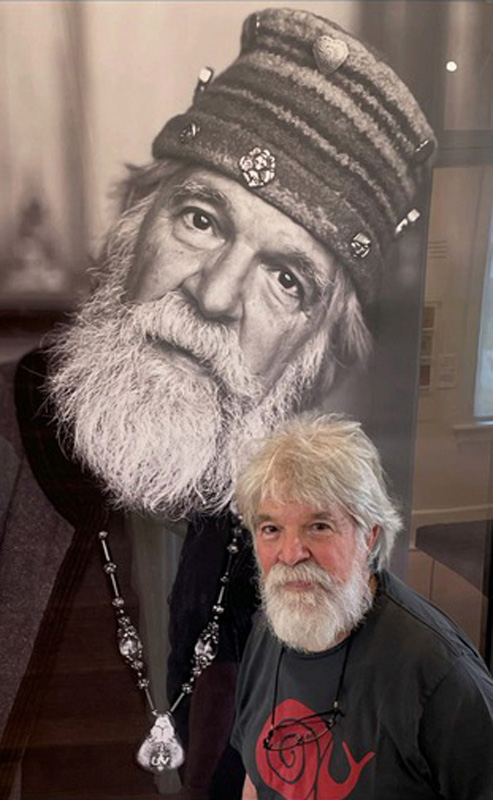Impish. Free-spirited. Rebel. Arty. Healer. Open-minded.
Those are some of the ways Vineyarders remember Dr. Sumner Silverman, a psychologist and artist who passed away in December two days after his 80th birthday.
But many of us in the food community fondly remember Sumner for his service of more than 10 years on the board of Slow Food Martha’s Vineyard, an organization that supported local farms, fishermen, and the culture of food traditions here on the Island. A short, affable, friendly soul — he literally stood at only 5’ 2” or 5′ 3” — Sumner’s life centered around food, as far as we could see.
Sumner’s close friend and longtime Slow Food board member Roxanne Kapitan recalls meeting him for the first time on the Island one evening at an Aquinnah potluck before Slow Food was founded. She had brought a quail dish from birds she had raised with then-partner Jason BenDavid. Upon telling the gatherers they had raised, slaughtered, and roasted these birds, she vividly recalls one woman at the potluck responding rather loudly, “Murderer, murderer!” A few moments later, she said, Sumner came into the kitchen, leaned into her shoulder and asked, “Are those roasted quail? Oh, I love you.”
“It was slow food right from the start,” Roxanne says.
The Slow Food MV chapter was started in 2005-06 by Rick Karney who had represented the MV Shellfish Group at a worldwide Slow Food gathering in Italy; Slow Food had been founded to counter the spread of McDonald’s in that country. A core group of 12 to 14 of us started meeting here to organize the chapter, and Sumner, brought on by Roxanne, signed on from the start to serve on the board.
We planned to meet at each other’s homes to plan our many public events, and sometimes we did, but we inevitably ended up meeting nearly exclusively at Sumner’s Tisbury home on Peacegate Road, where he lived with his wife Sally Pierce.
“They had that fabulous kitchen,” recalls board member Hara Dretaki. “It was a kitchen we all fit in,” noted Oak Bluffs resident Nancy Weaver, one of the many Slow Food regulars. “It was built for entertaining.”
Board members (and friends) always arrived with food they had raised, foraged, or gathered from local waters such as clams, oysters, or bay scallops, depending on the season. Everyone in Slow Food shared a passion for food. One dish seemed better than the next. And there was usually bread Sumner had made, recalls Jean-Marc Dupon, who grew up cooking with his father at Le Grenier. Jean-Marc is the husband of former board member Suzan Bellincampi. Suzan said she would sometimes ask Sumner for a recipe but never knew exactly how to handle the recipe afterward because Sumner would say “I changed this and this and that.”
There were always tours around Sumner and Sally’s custom home each time new people came to our meetings. The home was built by Don Keller, who worked for DECCA Construction and who became Sumner’s caretaker and good friend. We marveled at the hidden meditation room on the second floor behind a bookshelf, his extensive jewelry workshop in the basement, the gardens, and even the kitchen pantry.

“The pantry was floor-to-ceiling jars and canned goods,” describes Jan Buhrman, who served on the board with Sumner and who recently retired from running Kitchen Porch catering. “He had everything from wine to beer to figs. Sumner probably never had a problem during COVID.”
“There were so many aspects to him,” says Hara. He discussed philosophy and religion, and he reveled in his 13 trips to Burning Man, a free-wheeling, nine-day art and counterculture festival in Black Rock Desert, Nev., she says. “He saw life as something to be joyous about. He was always so lighthearted and jovial, but also so caring.” Hara described Sumner as devoted to his wife Sally. When Sally fell mysteriously ill and ended up in a memory care facility, where she lives today near her family, Hara noted Sumner’s health seemed to deteriorate quickly.
From Sumner and Sally’s kitchen and living room, our Slow Food MV chapter planned many community events over those years and Sumner volunteered at nearly each and every one. There were monthly potlucks open to the public at the Agricultural Hall in West Tisbury and the annual summer potluck with speakers like Michael Pollen, Dr. Jessica Harris, and Judith Jones, Julia Child’s longtime editor. For many of the smaller events, Sumner set the tone from the beginning and said each event needed to include food of some sort, and it did. We invited beekeepers to share their craft and offered a honey-filled brunch. Wampanoag tribe members talked to us about food traditions and we shared a feast together featuring their native dishes — the original slow food of the Island, when there were literally no stores and everything came from the land or sea. We held farmer’s nights where we met local food producers, permaculture education, oyster festivals, kale festivals, wild foods walks, and on and on.
I remember one meeting where we were discussing possibilities for the next community event, and distinctly remember Sumner saying he didn’t really care what we did, as long as there was food. I laughed; typical Sumner.
Sumner also loved cultivating many different types of fruit trees, and had a large garden with his prized asparagus bed. “His yard was an extension of his kitchen,” says former board member Fala Freeman, a local real estate agent. When Sumner and Sally’s house came on the market, Fala showed it to a prospective client and took one last walk through the home, which was typically ringing with laughter and filled with good food. “It was so bittersweet to go through the house, every piece of them gone, and to see that gorgeous empty shell that had been their world.”
There were pear trees, mulberry bushes, gooseberries, blackberries, and of course his famous, famous fig trees. Many people on the Island now grow figs, thanks to Sumner’s encouragement and his ready bucket of fig cuttings to give away. West Tisbury resident and Slow Foodie Gail Tipton didn’t get figs but Solomon’s seal instead, which is edible and still grows in her yard — along with a dinner from Sumner after one of her hip surgeries.
“I have many fond memories of Slow Food feasts at Sumner and Sally’s house,” says Rebecca Gilbert of Native Earth Farm in Chilmark, where a number of Slow Food events took place over the years. “After one of the feasts, he brought out a bucket of fig cuttings from his tree and handed them out, telling us how to start them and saying ‘take a few more, take a few more.’ This was the beginning of my fig growing passion. He did not remember the variety unfortunately, but last year we were deluged with fresh figs off the bushes we grew from those cuttings. We planted one outside and it grows up large and vigorously every summer, but we never get figs because it freezes too hard in the winter. We have a couple more in large pots in the unheated but covered hoop house where it dips below freezing sometimes, but it is protected, and those are the ones that give us figs. Thank you, Sumner.”
The Slow Food MV chapter, which started in 2005-2006, the same year Island Grown Initiative was born, ended its service to the Island in 2017. Many chapters around the country and world continue their work today.

